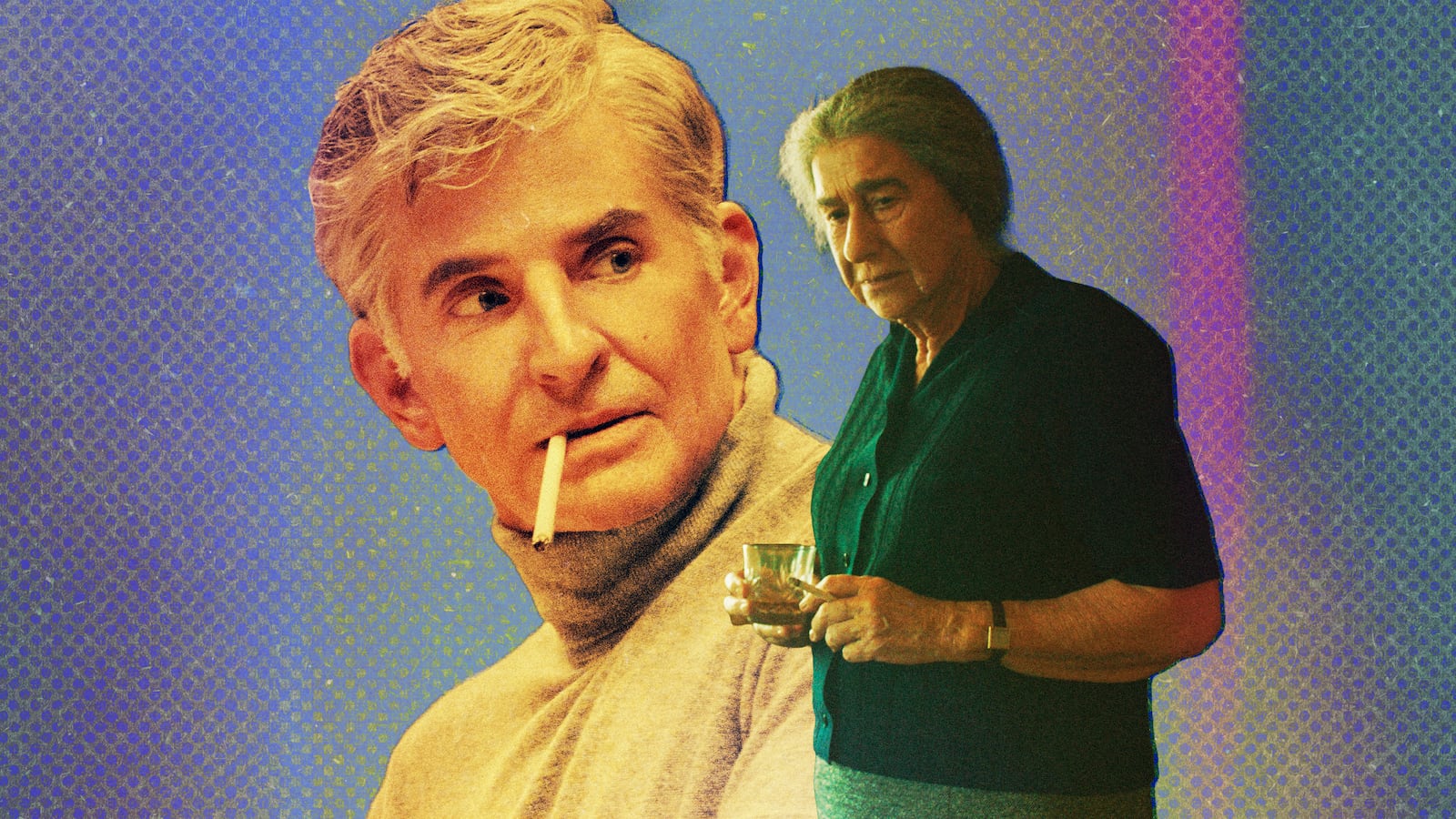A few weeks ago, my partner and I cozied up on our couch and pressed play on Maestro. Within just a few minutes, we had to pause the film because we were giggling in disbelief. We knew going in that Bradley Cooper would be wearing facial prosthetics to transform into Jewish composer Leonard Bernstein. We had seen the stills and the trailer. Heck, I even wrote about the fake nose! But we wanted to give the biopic the benefit of the doubt and watch the entire film, in earnest, before judging. Instead, the first scene confirmed our initial criticisms. “How did this get the green light?” we wondered aloud.
Fast forward to today and Maestro has been nominated for seven Oscars—“Best Makeup and Hairstyling” among them. And, oddly enough, Cooper’s passion project is not the only film up for that award that uses prosthetics to “Jew up” a non-Jewish performer. Golda, starring Helen Mirren as the fourth prime minister of Israel, is also nominated. Given the history of this category, though, perhaps I shouldn’t be surprised. Last year, The Whale, starring Brendan Fraser outfitted in a fat suit, nabbed the Academy Award for hair and makeup.
Current online conversations about the Oscars are laser-focused on Barbie’s supposed snubs, but given the controversial nominees for hair and makeup in back-to-back years, this sometimes overlooked category deserves a little more attention. Academy Award noms for fat suits and Ashkenazi noses, however skillfully done, legitimize the treatment of certain bodies and ethnicities as costumes and undermine diversity gains in the film industry. Just because makeup artists can transform performers beyond recognition, does that always mean they should?
“Best Makeup and Hairstyling” is a relatively new category at the Oscars. Created in 1981, the first award went to special effects makeup artist Rick Baker for his work on An American Werewolf in London. Creature designs and fantastical makeup have historically dominated this category. Winners that fit this bill include Beetlejuice, Terminator 2, Bram Stoker’s Dracula, The Lord of the Rings, and Mad Max: Fury Road, all for obvious reasons. However, since the award’s inception, the category has also been plagued by controversy for honoring films that metamorphose actors into different races, genders, and body types.
In 1982, for example, makeup artist Tom Smith was nominated for Gandhi, in which Ben Kingsley donned brownface to play the Indian activist. While Kingsley is half-Indian, the choice to darken his skin caused a backlash. The 1990s saw multiple films nominated for makeup many would balk at now: Mrs. Doubtfire won in 1993 and The Nutty Professor in 1996. Norbit was nominated in 2007, the second film to feature Eddie Murphy in a fat suit to be recognized for makeup and hairstyling.

Bradley Cooper and Carey Mulligan in Maestro.
Jason McDonald/NetflixDespite the recent push to increase diversity in movies, the honorees for makeup and hair at the Oscars in even the last 10 years suggest that these efforts do not extend everywhere. The 2013 victor, Dallas Buyer’s Club, stars Jared Leto as a trans woman. Vice, the 2018 awardee, features Christian Bale in a fat suit to embody Dick Cheney. Last year, three of the movies nominated in the category used prosthetics to give performers larger bodies: The Batman, Elvis, and the winner, The Whale. As Farah Fleurima observed in The New York Times in 2023, Hollywood just can’t quit the fat suit.
Speaking to People about The Whale, Mean Girls star Daniel Franzese pointed out that there are actual fat actors who lose out on roles to thin performers who are then made up to look fat. Yes, stories about marginalized people are being told, but not by those people or for those people. The same logic could be applied to many of these hair and makeup nominees: A trans woman could have been hired for Dallas Buyer’s Club, and a darker-skinned Indian actor could have starred in Gandhi. The Academy has the opportunity to push Hollywood to be more inclusive. Yet it continues to cosign special effects makeup that is not only offensive but also keeps historically excluded performers from landing jobs.
Hitting back at these criticisms, The Whale director Darren Aronofsky told Yahoo! Entertainment, “Actors have been using makeup since the beginning of acting—that’s one of their tools.” True, but that logic only goes so far. Blackface is makeup. It was a tool for actors. And, yet few people would endorse its use in film today.
Which brings us to the category’s current “Jewface” problem.
In the cases of Maestro and Golda, the use of prosthetics to transform non-Jewish performers into Jewish figures is complicated. Maestro, in particular, has received considerable blowback for the choice to put Cooper in a fake nose, and the Academy's decision to potentially award the film's makeup feels like a slap in the face to many.

Camille Cottin and Helen Mirren in Golda.
Sean Gleason/Bleecker StreetIronically, Sarah Silverman co-stars in Maestro as Leonard Bernstein’s younger sister Shirley despite her own protestations in the past about Hollywood’s tendency to cast non-Jews as iconic Jewish figures. “One could argue, for instance, that a Gentile playing Joan Rivers correctly would be doing what is actually called ‘Jewface,’” the comedian said on her podcast in 2021 after actress Kathryn Hahn was cast in a yet-to-be-produced limited series about Rivers. “It’s defined as when a non-Jew portrays a Jew with the Jewishness front and center, often with makeup or changing of features, big fake nose, all the New York-y or Yiddish-y inflection. And in a time when the importance of representation is seen as so essential and so front and center, why does ours constantly get breached?” (Contrary to popular belief, Silverman did not coin the term “Jewface,” although she did popularize it. The term originated in the 1800s during the vaudeville era.)
Plenty of Jews—this writer included—find the fake nose offensive, or at the very least, thoughtless. And many—including Bernstein’s own children—apparently don’t. But to dismiss the prosthetic as a nonissue or any criticisms as performative hand-wringing, as some critics have, seems willfully ignorant. The creative choice to slap a fake schnozz on Cooper unintentionally plays into a centuries-long history of the “stage Jew.” (The Merchant of Venice is one of the best-known examples of this.) Of course it would strike a nerve.
But what adds to the prosthetic’s offensiveness is its lack of necessity. The idea that Cooper needed to don a fake nose for audiences to buy him as Bernstein is an insult to viewers’ intelligence. Oppenheimer, nominated for 13 Oscars (including “Best Makeup and Hairstyling”), stars Cillian Murphy as the titular Jewish inventor of the atomic bomb. Unlike Cooper, Murphy doesn’t wear prosthetics. He simply acts.
In aiming for realism, Golda and Maestro are incidentally offensive when they could be great. The makeup artists nominated for these films are unquestionably talented and deserving of recognition, but their skills were used for insensitive purposes. And this year, the Academy risks honoring problematic mimicry over art in the hair and makeup category… yet again.






